Horn of Africa. Egyptian arms supplies to Somalia raise dangerous tensions with Addis Ababa.
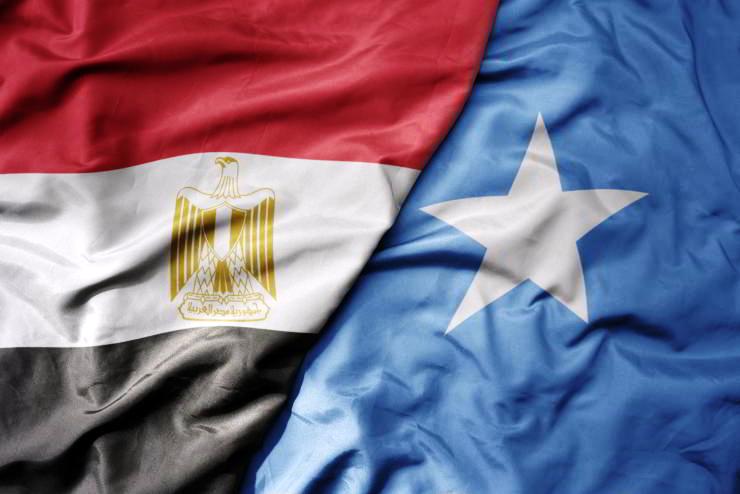
Egypt and Somalia are increasing their military cooperation to pressure Ethiopia over their respective concerns: the Renaissance Dam on the Nile and recognition of the breakaway state of Somaliland. In this volatile context, Turkey, which has good relations with all sides, could help defuse tensions.
On 23 September, officials in Mogadishu confirmed to the press that an Egyptian warship had delivered anti-aircraft guns and artillery to Somalia. The shipment was sent “to support and build the capabilities of the Somali army”, according to a statement from the Egyptian Foreign Ministry the same day. A month earlier, on 27 August, the Cairo government sent two planeloads of arms and ammunition to Somalia following the signing of a joint security pact. These shipments serve several purposes. By sending these weapons to Somalia, the Egyptian authorities are sending a message of their strong opposition to the Ethiopian government’s decision of 10 September last to proceed with the fifth filling of the $5 billion Great Ethiopian Renaissance Dam (GERD) reservoir on the Blue Nile.
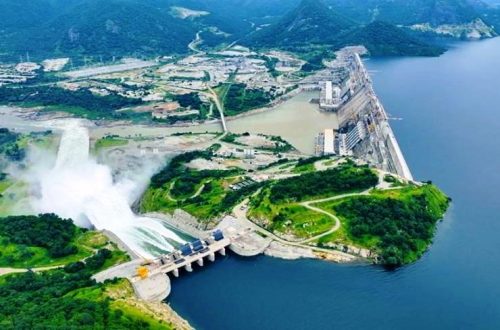
Grand Ethiopian Renaissance Dam aerial view. Photo: Prime Minister Office Ethiopia
On 24 September, Egyptian Foreign Minister Badr Abdelatty condemned Ethiopia’s “unilateral decision” to reduce Egypt’s water supply in violation of international law and the Tripartite Declaration of Principles signed in 2015 by Ethiopia and its downstream neighbours, Sudan and Egypt. The minister added that Egypt would take all the necessary measures allowed by the UN Charter to defend the interests of its people and stop the filling process that is underway.
According to the Addis Ababa authorities, the reservoir currently holds 49 billion cubic metres, but the aim is to fill it to 74 billion cubic metres and reach a hydroelectric capacity of 6,000 MW.
But in a letter to the UN Security Council, Ethiopian Foreign Minister Taye Atske-Selassie rejected these claims, arguing that the use of natural resources is a matter of national jurisdiction and that cross-border disputes should be resolved through bilateral and regional mechanisms.
The letter also mentions the ratification by Ethiopia and five other upstream Nile Basin states (Burundi, Rwanda, South Sudan, Tanzania and Uganda) of the Nile Basin Cooperative Framework Agreement and the establishment of the Nile Basin Commission, which are rejected by the downstream states. Indeed, both Sudan and Egypt continue to adhere to the 1902 Treaty signed by Great Britain and Egypt, which sets the rules of the Nile game and prohibits upstream states from using the waters of the Nile without the consent of downstream states.
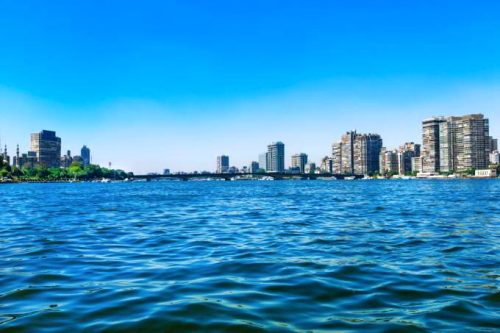
The river Nile flows through Cairo. 123rf
The threat of an attack on the GERD, made in 2013 by Egyptian politicians including Younis Makhyoun of the Islamist Party under Mohamed Morsi’s presidency, was taken seriously by Ethiopia, which purchased air defence equipment from Russia and Israel.
According to the website www.military.africa, Addis Ababa deployed Russian-made Pantsir-S2 surface-to-air missiles and an anti-aircraft artillery system in 2021 to enhance the protection of its Grand Ethiopian Renaissance Dam (GERD), providing capabilities against multiple threats, including aircraft, helicopters, drones and cruise missiles. At the same time, Ethiopia acquired Israeli Skylock counter-UAS anti-drone equipment and a Ukrainian ST-68UM radar system specialising in airborne target detection.
After attempts by the African Union to mediate between Egypt, Sudan and Ethiopia over the GERD failed in 2021, Egypt confirmed Ethiopia’s fears by declaring in May 2022 that it would explore all options. Military options were on the menu. Indeed, Egypt had previously ordered $2 billion worth of US-made F-16 fighter jets from Russia to replace its short-range US-made F-16s with Sukhoi-35 jets capable of reaching Ethiopian airspace. Another bone of contention prompted Egypt to supply arms to Somalia. According to some experts, Egypt is also concerned about the possibility that Ethiopia could boast of its own Red Sea port and establish a naval base there, challenging Egypt’s supremacy over international maritime traffic through its control of the Suez Canal.
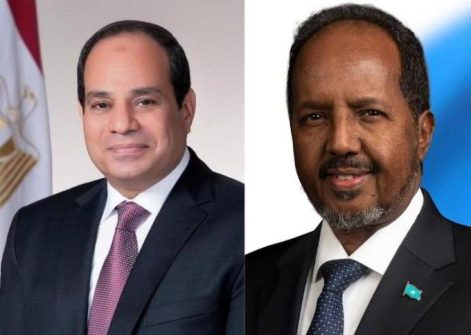
Egyptian President Abdel Fattah El-Sisi and Somali President Hassan Sheikh Mohamud. Office of the president
In January 2024, Egyptian President Abdel Fattah el-Sisi strongly supported Mogadishu. “Egypt will not allow anyone to threaten Somalia or affect its security,” he said during a press conference with visiting Somali President Hassan Sheikh Mohamud.
The Egyptian concern follows Addis Ababa’s signing of a preliminary agreement in January 2024 with the unrecognised state of Somaliland to lease land for a port in exchange for possible recognition of its independence from Somalia. This concern coincides with the anger of the Mogadishu government, which has called the deal an “assault on its sovereignty” and vowed to block it by any means necessary, and explains why Egypt and Somalia signed such a security pact. Egypt even offered to send troops to a new peacekeeping mission to replace the 10,000 Ethiopian troops tasked with fighting al-Qaeda-linked al-Shabab militants. Ethiopia has some 3,000 troops in Somalia as part of the African Union peacekeeping mission (ATMIS), while some 7,000 troops are deployed under a bilateral agreement.
Such an exchange could happen. Indeed, despite the jihadist threat, Somalia is so outraged by the Ethiopia-Somaliland port deal that it has threatened to kick Ethiopian troops out of its territory by the end of the year unless Addis Ababa scraps the port agreement.
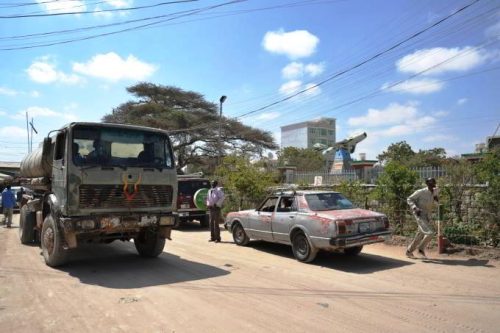
Hargeisa, the largest city and capital of the unrecognized state of Somaliland.123rf
All these arms supplies have increased tensions in the region. In Somaliland, the foreign ministry expressed “profound concern” because accordingly they could land in the wrong hands including al Shabaab, alleging that the “Mogadishu administration cannot currently effectively manage or safeguard such a large cache of military equipment.” A further sign of the increasing tensions has also been a call by the Egyptian embassy in Mogadishu, urging its citizens not to travel to Somaliland for security reasons.
At the same time, observers such as Adam Aw Hirsi, director of the Mogadishu-based think tank Foresight for Practical Solutions, point out that the Egyptian-Somali alliance is only the latest chapter in a long history that dates back to the successive reigns of the pharaohs in Egypt. Accordingly, both countries are fellow members of the Arab League and the Organisation of Islamic Cooperation. Back in the 1970s and 1980s, during the Ogaden war between Somalia and Ethiopia, Egypt stood by Somalia. Such Egyptian involvement causes some worries in the region. “If the Egyptians put boots on the ground and deploy troops along the border with Ethiopia, it could bring the two into direct confrontation,” fears Rashid Abdi, an analyst with the Sahan Research think-tank. Meanwhile, Ethiopia is raising the tone. On 28 September, the foreign ministry in Addis Ababa accuses the Mogadishu government of “colluding with external actors aiming to destabilise the region”.
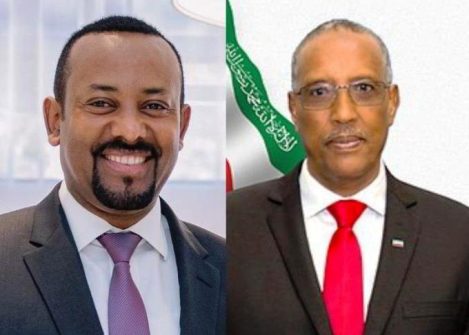
The prime minister of Ethiopia, Abiy Ahmed and Muse Bihi Abdi, the president of Somaliland. Office of the Prime Minister – Ethiopia – Madaxtooyada JSL
While some voices suggest that the East African Community which Somalia joined in March 2024 should come up and guarantee this country’s security in front of Ethiopia, others speculate about the possibility that Turkey, which has managed to establish strategic relations with Ethiopia and Somalia, could play a mediation role and defuse some of the tensions.
Since 2011, Turkey established a military cooperation with Somalia, opened an hospital there and inaugurated its largest embassy on the African continent. In 2021, Turkey also signed a military agreement with Ethiopia and sold drones to Addis Ababa during the war with Tigray. Since last July, Turkey hosted two rounds of talks between Somalia and Ethiopia over the Somaliland deal which still has to be finalized. (Open Photo: Egypt and Somalia flag/ Shutterstock)
François Misser



